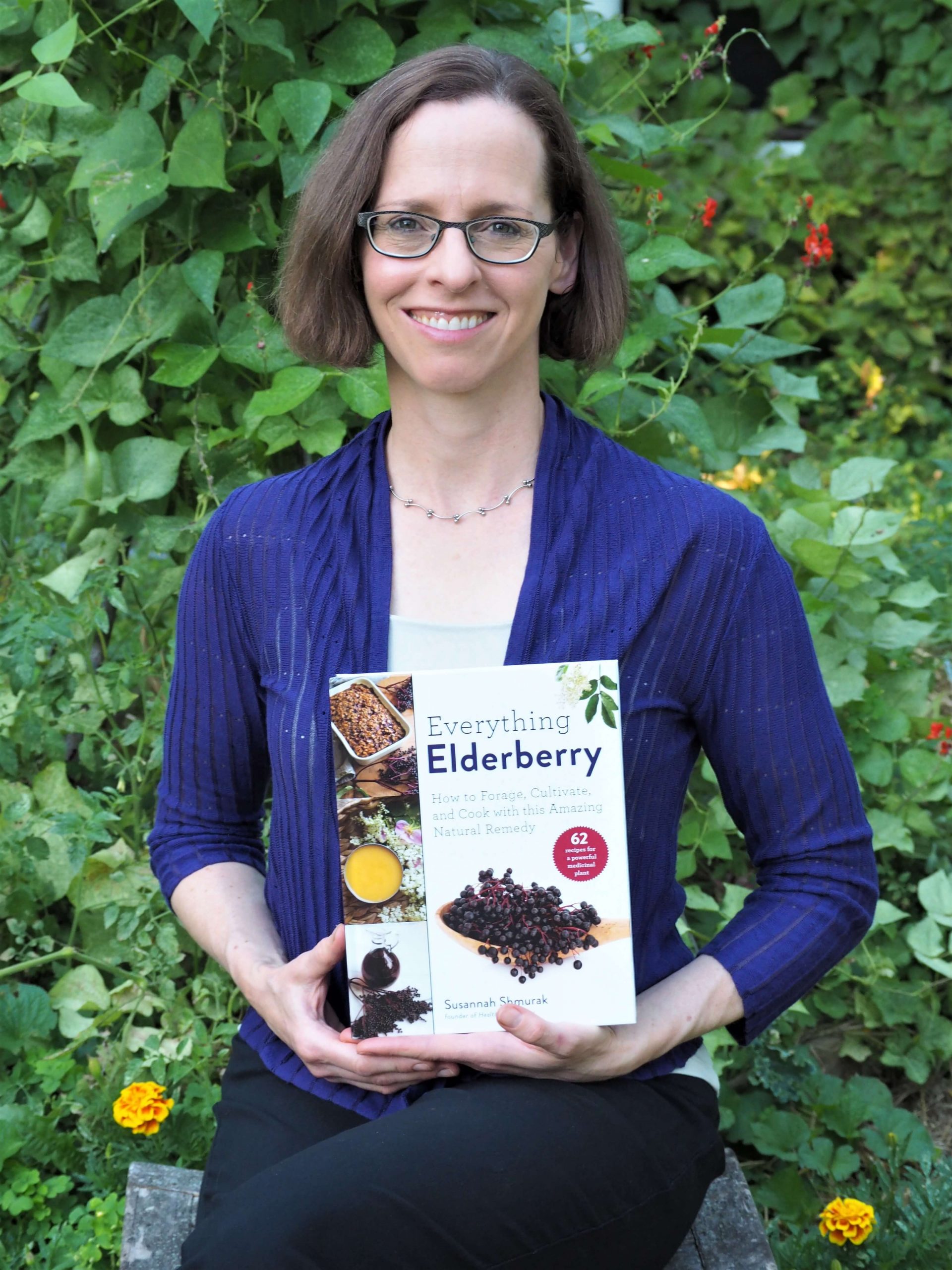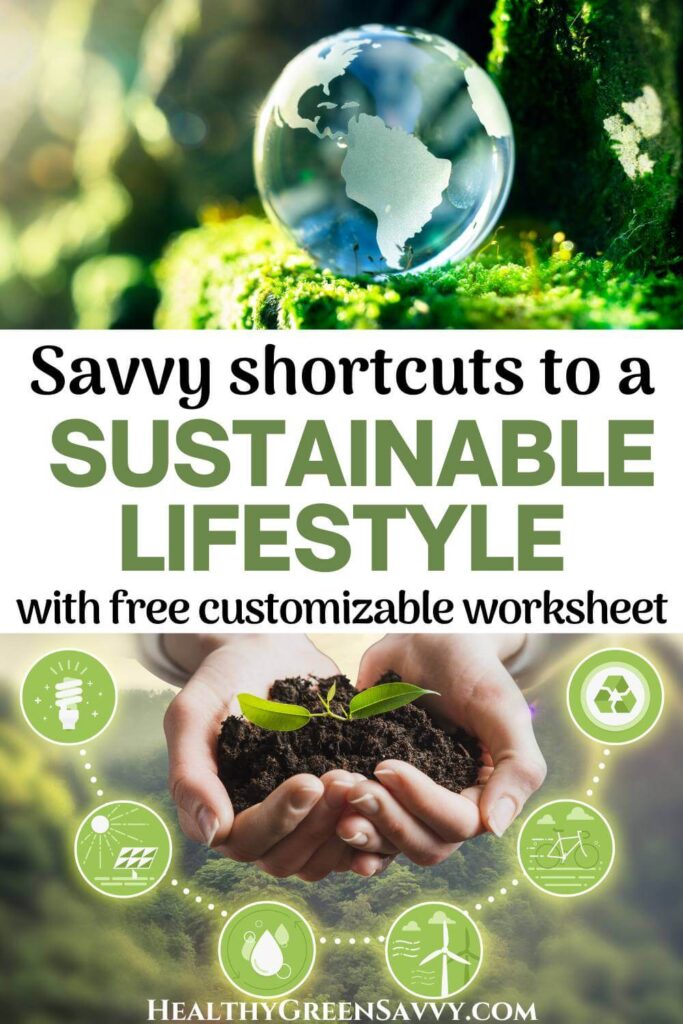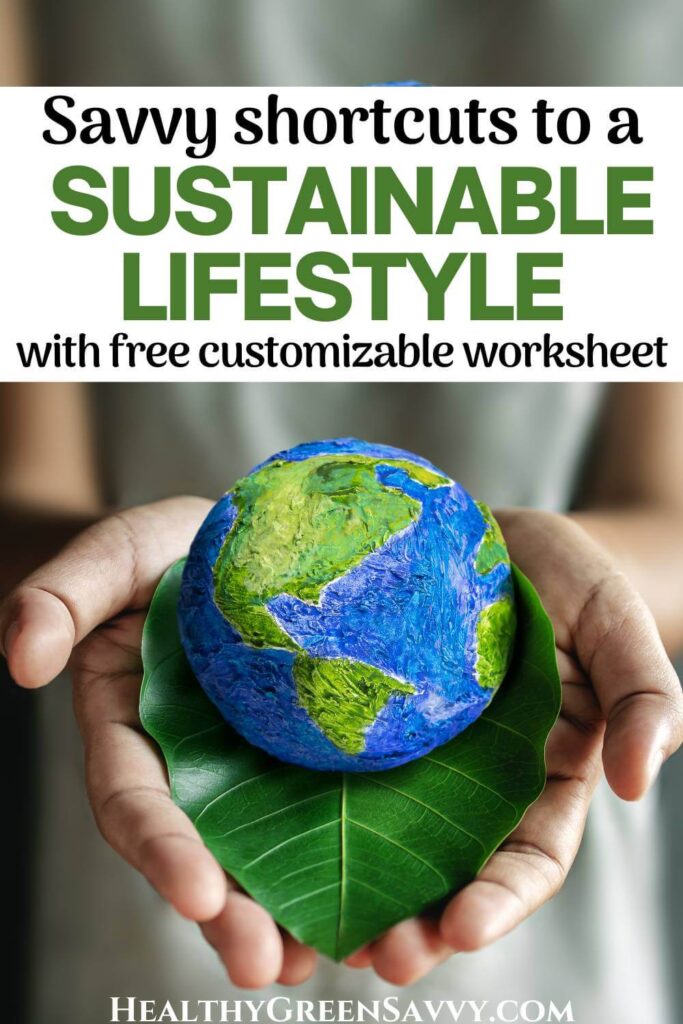Last Updated on December 3, 2024
Trying to make your lifestyle more sustainable? All the actions we take can add up, but sometimes it’s hard to decide what to focus on. I’ve done the research for you to make your transition to a sustainable lifestyle as easy as possible. Here’s a customizable roadmap to help you move toward sustainable living.
Inside: Learn the benefits of sustainable living and the most effective steps you can take to shift to a sustainable lifestyle.
Sustainable Living 101: Why & How to Shift to a Sustainable Lifestyle
You’ve probably heard the caution, if everyone on the planet lived like us, we’d need three Earths. Fact is, though, we only have one planet, but we’ve been living as though we have several.
“Earth Overshoot Day” has been moving earlier with every passing year. The systems we depend on, the air, water, and soil, have all degraded, threatening humanity’s very existence.
It doesn’t have to be this way. We all have the power to change the way we live, and we all have a responsibility to help shift the needle. Everything we do matters.
Here’s more on what sustainable actually means.
BUT that isn’t to say you should beat yourself up for every environmentally-unfriendly action you take. Besides the fact that our society is simply not set up to make living ecologically easy, eco-guilt is unproductive.
Vow to do what you can, and try not to sweat what you can’t. If everyone in the developed world took the steps outlined below, the world would be in much better shape.
(Note that some of what’s below involves pressuring governments and corporations to shift to sustainability so it’s not so darn difficult to live sustainably ourselves.)
Benefits of Sustainable Living
- You’ll save money. Using less means conserving resources, and any investment you make in renewable energy will pay you back many times over. These are my top picks for eco hacks that will save you money.
- You’ll likely reduce your exposure to chemicals. Buying less plastic will cut your exposure to the numerous hormone-disrupting and carcinogenic chemicals that leach into your water and processed food.
- You’ll feel better. Eco-guilt can weigh on you, and taking action to do the right thing ecologically is one effective way to address the climate anxiety so many of us feel.
How to Start Living More Sustainably
Remember, none of us is perfect, and the way our society is set up can make sustainable living very challenging. Don’t waste energy beating yourself up about what you don’t do and focus on what you can do. Below are the things that can make the greatest difference.
I’ve created a free customizable worksheet to pinpoint the things in your own life that you can shift to make your day-to-day habits more sustainable.
Click here to download the free PDF: Sustainable Living Made Easier: A Customizable Worksheet
1. Start with Your Car
If you don’t have a car-based lifestyle, move on to #2. And be pleased that you live somewhere that makes car-free living possible!
If you drive regularly, the number one place to start your shift to sustainable living is your car. Driving less by walking, biking, or ridesharing will cut your carbon emissions dramatically.
When you need to replace your car, make choosing a fuel efficient car a priority. You’ll not only slash the carbon output of your commute, you’ll save money.
2. Eat Lower on the Food Chain
Meat and cheese are way up there in most people’s contributions to climate pollution, and focusing on plant-based meals will help cut your impact. Here’s a list of vegan protein sources, and below are some of my go-to vegetarian meals:
Even better if you’re buying foods without packaging, such as from a local CSA or even grown yourself. Eating seasonally will help you savor the flavors of fresh, local food and help cut the environmental footprint of your diet.
3. Save Energy in Your Home
The best thing you can do to conserve energy in your home is to get an inexpensive home energy audit from your utility, which will show you where you’re wasting energy and will probably include enough sealing and energy-saving freebies to more than pay for the audit. And it is such an amazing education about your home uses (and wastes) energy!
For households that qualify, the federal incentives for energy efficiency that take effect in 2023 may make efficient equipment less expensive to purchase than their wasteful counterparts. Look into the incredible incentives on heat pumps especially. Here’s more about the pros and cons of heat pumps, with details about they save energy on both heating and cooling.
4. Shrink Your Waste Print
Buying less and keeping an eye out for excess packaging can significantly cut down on your overall ecological footprint.
When you shop, choose the most minimally-packaged items you can. Say no to shrink-wrapped cucumbers and bagged apples, and use reusable produce bags to corral your fruits and veggies.
Much of the single-use plastic we go through for bathroom products, beverages, and packaged food more can be replaced with reusable options. Here’s a beginner’s guide to zero waste living to help you make the transition.
Make the most of what you do buy by eating root-to-stem and composting what you can’t use. Give things additional uses with creative repurposing like these uses for orange peels or used coffee grounds.
If you’re looking to keep up your eco-conscious habits around the holidays, check out these sustainable gift ideas.
5. Speak Up
While changing our own habits is important and models environmentally-preferable behavior for others, what we need more than anything is for the businesses providing the stuff of our everyday lives to changes their behavior. We can’t buy package-free food if no one sells it in our communities!
Use your words. Write companies you buy from and urge them to seek alternatives to plastic. Tag them on social media. Some Twitter storms about absurdly packaged produce got Whole Foods to pull it from their shelves.
Vote with your dollars. Support businesses doing right by the environment, from your everyday groceries to your clothing to your energy company. The number of B-Corporations grows daily. Here’s what to know about B-Corps.
Write your elected officials. Those in power need to know their constituents actually care about clean water and air and a safe future for our kids. Sign petitions. Write letters. Make phone calls. Join protests. The more the better.
How are you moving to a sustainable lifestyle? What have been the most important or rewarding changes you’ve made?
Don’t forget to download Sustainable Living Made Easier: A Customizable Worksheet.
Pin to save this info on how to create a sustainable lifestyle for later!

Susannah is a proud garden geek and energy nerd who loves healthy food and natural remedies. Her work has appeared in Mother Earth Living, Ensia, Northern Gardener, Sierra, and on numerous websites. Her first book, Everything Elderberry, released in September 2020 and has been a #1 new release in holistic medicine, naturopathy, herb gardening, and other categories. Find out more and grab your copy here.



 Hi, I'm Susannah, a garden geek, energy nerd, and fan of healthy food and natural remedies. Need some simple, practical solutions for living healthier and greener? You've come to the right place! More about me and my green projects
Hi, I'm Susannah, a garden geek, energy nerd, and fan of healthy food and natural remedies. Need some simple, practical solutions for living healthier and greener? You've come to the right place! More about me and my green projects
Leave a Reply